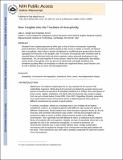New Insights into the Troubles of Aneuploidy
Author(s)
Siegel, Jacob; Amon, Angelika B.
Downloadnihms427431.pdf (1.444Mb)
OPEN_ACCESS_POLICY
Open Access Policy
Creative Commons Attribution-Noncommercial-Share Alike
Terms of use
Metadata
Show full item recordAbstract
Deviation from a balanced genome by either gain or loss of entire chromosomes is generally tolerated poorly in all eukaryotic systems studied to date. Errors in mitotic or meiotic cell division lead to aneuploidy, which places a burden of additional or insufficient gene products from the missegregated chromosomes on the daughter cells. The burden of aneuploidy often manifests itself as impaired fitness of individual cells and whole organisms, in which abnormal development is also characteristic. However, most human cancers, noted for their rapid growth, also display various levels of aneuploidy. Here we discuss the detrimental, potentially beneficial, and sometimes puzzling effects of aneuploidy on cellular and organismal fitness and tissue function as well as its role in diseases such as cancer and neurodegeneration.
Date issued
2012-07Department
Koch Institute for Integrative Cancer Research at MITJournal
Annual Review of Cell and Developmental Biology
Publisher
Annual Reviews
Citation
Siegel, Jake J., and Angelika Amon. “New Insights into the Troubles of Aneuploidy.” Annual Review of Cell and Developmental Biology 28, 1 (November 2012): 189–214 © 2012 Annual Reviews
Version: Author's final manuscript
ISSN
1081-0706
1530-8995